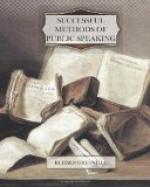I do not speak of his religious faith, that demands a worthier speaker and another occasion. But no one who knew Mr. Gladstone could fail to see that it was the essence, the savor, the motive power of his life. Strange as it may seem, I can not doubt that while this attracted many to him, it alienated others, others not themselves irreligious, but who suspected the sincerity of so manifest a devotion, and who, reared in the moderate atmosphere of the time, disliked the intrusion of religious considerations into politics. These, however, though numerous enough, were the exceptions, and it can not, I think, be questioned that Mr. Gladstone not merely raised the tone of public discussion, but quickened and renewed the religious feeling of the society in which he moved.
But this is not the faith of which I am thinking to-day. What is present to me is the faith with which he espoused and pursued great causes. There also he had faith sufficient to move mountains, and did sometimes move mountains. He did not lightly resolve, he came to no hasty conclusion, but when he had convinced himself that a cause was right, it engrossed him, it inspired him, with a certainty as deep-seated and as imperious as ever moved mortal man. To him, then, obstacles, objections, the counsels of doubters and critics were as nought, he pressed on with the passion of a whirlwind, but also with the steady persistence of some puissant machine.
He had, of course, like every statesman, often to traffic with expediency, he had always, I suppose, to accept something less than his ideal, but his unquenchable faith, not in himself—tho that with experience must have waxed strong—not in himself but in his cause, sustained him among the necessary shifts and transactions of the moment, and kept his head high in the heavens.
Such faith, such moral conviction, is not given to all men, for the treasures of his nature were in ingots, and not in dust. But there is, perhaps, no man without some faith in some cause or some person; if so, let him take heart, in however small a minority he may be, by remembering how mighty a strength was Gladstone’s power of faith.
His next great force lay in his industry. I do not know if the aspersions of “ca’ canny” be founded, but at any rate there was no “ca’ canny” about him. From his earliest school-days, if tradition be true, to the bed of death, he gave his full time and energy to work. No doubt his capacity for labor was unusual. He would sit up all night writing a pamphlet, and work next day as usual. An eight-hours’ day would have been a holiday to him, for he preached and practised the gospel of work to its fullest extent. He did not, indeed, disdain pleasure; no one enjoyed physical exercise, or a good play, or a pleasant dinner, more than he; he drank in deep draughts of the highest and the best that life had to offer; but even in pastime he was never idle. He did not know what it was




